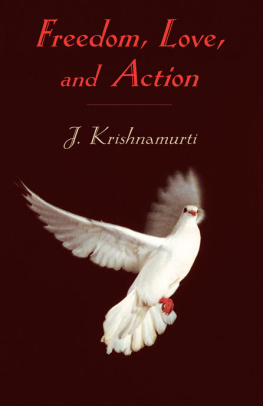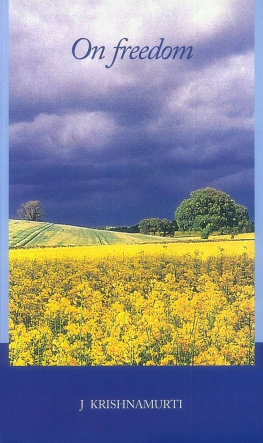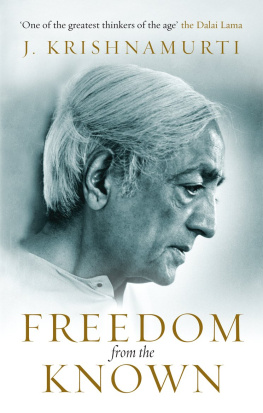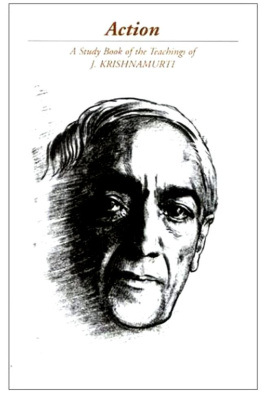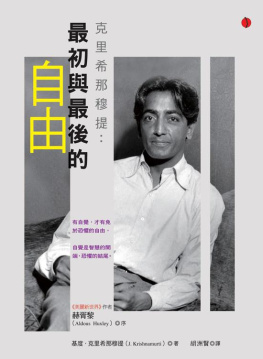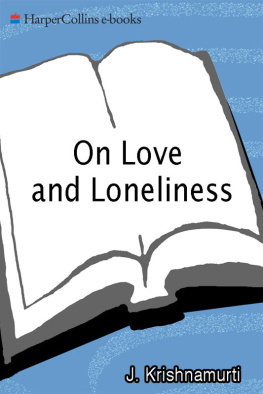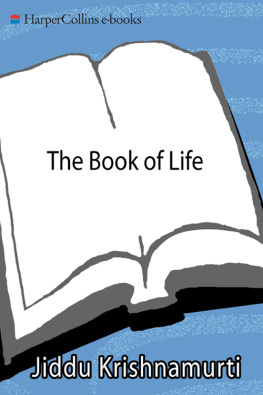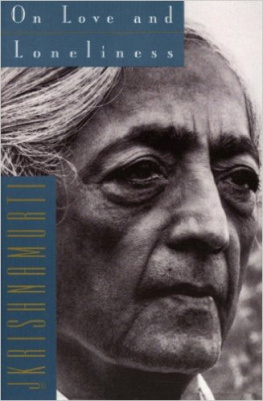Krishnamurti - Freedom, Love, and Action
Here you can read online Krishnamurti - Freedom, Love, and Action full text of the book (entire story) in english for free. Download pdf and epub, get meaning, cover and reviews about this ebook. publisher: Shambhala Publications, genre: Religion. Description of the work, (preface) as well as reviews are available. Best literature library LitArk.com created for fans of good reading and offers a wide selection of genres:
Romance novel
Science fiction
Adventure
Detective
Science
History
Home and family
Prose
Art
Politics
Computer
Non-fiction
Religion
Business
Children
Humor
Choose a favorite category and find really read worthwhile books. Enjoy immersion in the world of imagination, feel the emotions of the characters or learn something new for yourself, make an fascinating discovery.
- Book:Freedom, Love, and Action
- Author:
- Publisher:Shambhala Publications
- Genre:
- Rating:4 / 5
- Favourites:Add to favourites
- Your mark:
- 80
- 1
- 2
- 3
- 4
- 5
Freedom, Love, and Action: summary, description and annotation
We offer to read an annotation, description, summary or preface (depends on what the author of the book "Freedom, Love, and Action" wrote himself). If you haven't found the necessary information about the book — write in the comments, we will try to find it.
Freedom, Love, and Action — read online for free the complete book (whole text) full work
Below is the text of the book, divided by pages. System saving the place of the last page read, allows you to conveniently read the book "Freedom, Love, and Action" online for free, without having to search again every time where you left off. Put a bookmark, and you can go to the page where you finished reading at any time.
Font size:
Interval:
Bookmark:
ABOUT THE BOOK
In Freedom, Love, and Action, Krishnamurti points to a state of total awareness beyond mental processes. With his characteristic engaging, candid approach, Krishnamurti discusses such topics as the importance of setting the mind free from its own conditioning; the possibility of finding enlightenment in everyday activities; the inseparability of freedom, love, and action; and why it is best to love without attachment.
JIDDU KRISHNAMURTI (18951986) was one of the most influential spiritual teachers of the twentieth century. He traveled and lectured throughout the world until his death at the age of ninety. His talks and works are preserved in more than seventy books.
F REEDOM, L OVE, AND A CTION

J. Krishnamurti

S HAMBHALA
Boston & London
2013
Shambhala Publications, Inc.
Horticultural Hall
300 Massachusetts Avenue
Boston, Massachusetts 02115
www.shambhala.com
1994 Krishnamurti Foundation Trust Ltd,
Brockwood Park, Brandean,
Hampshire SO24 0LQ, England.
Cover art: 2001 Sue Streeter/Stone
Consisting of Five Conversations, 1968 Saanen Gatherings Committee; Eight Conversations, 1969 Krishnamurti Foundation, London; Meditations 1969, 1969 Krishnamurti Foundation, London; Inward Flowering, 1977/1992 Krishnamurti Foundation Trust Ltd; A Dialogue with Oneself , 1977 Krishnamurti Foundation Trust Ltd, London.
All rights reserved. No part of this book may be reproduced in any form or by any means, electronic or mechanical, including photocopying, recording, or by any storage and retrieval system, without permission in writing from the publisher.
For information in USA, write:
Krishnamurti Foundation of America
P.O. Box 1560
Ojai, CA 93024
The Library of Congress catalogues a previous edition of this book as follows:
Krishnamurti, J. (Jiddu), 1895
Freedom, love, and action/J. Krishnamurti.1st ed.
p. cm.(Shambhala pocket classics)
Collection of five booklets based on talks given at Brockwood Park School, England.
Contents: Five conversationsEight conversationsMeditationsInward floweringA dialogue with oneself.
eISBN 978-0-8348-2413-3
ISBN 978-0-87773-977-7 (pbk.: alk. paper)
ISBN 978-1-57062-826-9
1. Conduct of life. I. Title. II. Series
B5134.K751 1994b 93-34722
181.4dc20 CIP
Contents
M EDITATION IS THE WAY of total transformation of mans mania. Man is caught in principles and ideologies which prevent him from putting an end to the conflict between himself and another. The ideology of nationality and religion and the obstinacy of his own vanity is destroying man. This destructive process goes on throughout the world. Man has tried to end it through tolerance, conciliation, through the exchange of words, and face-saving devicesbut he remains entrenched in his own conditioning.
Goodness does not lie in dogma, nor in the vanity of principle and formula. These deny love, and meditation is the flowering of love.
The valley was very still that early morning. Even the owl had stopped calling his mate; his deep hoot had ceased an hour earlier. The sun wasnt up yet and the stars were still brilliant. One star was just setting over the western hills and the light from the east was slowly spreading. As the sun rose, the rocks, with dew on them, were shining, and the cactus and the leaves became silver, highly polished. And the beauty of the land began to awaken.
The monkeys were on the veranda now, two of them, red-faced, with brown coats, and tails not too long. One was scratching the other looking for insects, and when he found them he picked them out carefully and swallowed them. They were restless, and they jumped off the veranda on to the branch of a large rain tree and wandered off into the gully.
Even though the village had awakened there was still the stillness of the night. It was a peculiar stillness. It was not the absence of noise. It was not that the mind brought about the stillness or conceived it out of its own endless chattering. It was a stillness that came without asking, without any cause. And the hills, the trees, the people, the monkeys, the crows which were calling, were all in it. And it would go on until the evening. Only man was not aware of it. It would be there again when the night came, and the rocks would know it, and the newly planted banyan tree, and the lizard between the rocks.
There were four or five people in the room. Some were students, others college graduates with jobs. One of the students said, I listened to you last year, and again this year. I know we are all conditioned. I am aware of societys brutalities, and of my own envy and anger. I know also the history of the church and its wars and its unprincipled activities. I have studied history and the endless wars of the entrenched beliefs and ideologies which are creating so much conflict in the world. This mania of mankindwhich is me alsoseems to hold us and we seem to be doomed forever, unless, of course, we can bring about a change in ourselves. Its the small minority that really matters, that really having changed itself can do something in this murderous world. And a few of us have come, representing others, to discuss this matter with you. I think some of us are serious, and I dont know how far this seriousness will carry us. So, first of all, taking us as we are, half-serious, somewhat hysterical, unreasonable, carried away by our assumptions and vanitiestaking us as we are, can we really change? If not, were going to destroy each other; our own species will disappear. There may be a reconciliation in all this terror but there is always the danger of some maniacal group letting loose the atom bomb, and then we shall all be engulfed in it. So seeing all this, which is fairly obvious, which is being described endlessly by authors, professors, sociologists, politicians, and so onis it possible to change radically?
Some of us are not quite sure that we want to change, for we enjoy this violence. For some of us it is even profitable. And for others, all they desire is to remain in their entrenched positions. There are still others who through change seek some form of super excitement, overrated emotional expression. Most of us want power in some form or anotherthe power over oneself, the power over another, the power which comes with new and brilliant ideas, the power of leadership, fame, and so on. Political power is as evil as religious power. The power of the world and the power of an ideology do not change man. Nor does the volition to change, the will to transform oneself, bring about this change.
I can understand that, said the student. Then what is the way of change if will, if principles and ideologies are not the way? Then what is the motive power? And change to what?
The older people in the room listened to this rather seriously. They were all attentive, and not one of them looked out of the window to see the green-yellow bird sitting on a branch sunning himself that early morning, preening himself, grooming his feathers, and looking at the world from the height of that tall tree.
One of the older men said, I am not at all sure that I want any change at all. It might be for the worse. Its better, this orderly disorder, than an order which may mean uncertainty, total insecurity, and chaos. So when you talk of how to change, and the necessity of change, I am not at all sure I agree with you, my friend. As a speculative idea I enjoy it. But a revolution which will deprive me of my job, my house, my family, and so on, is a most unpleasant idea and I dont think I want it. Youre young and you can play with these ideas. All the same, I will listen and see what the outcome of this discussion will be.
Next pageFont size:
Interval:
Bookmark:
Similar books «Freedom, Love, and Action»
Look at similar books to Freedom, Love, and Action. We have selected literature similar in name and meaning in the hope of providing readers with more options to find new, interesting, not yet read works.
Discussion, reviews of the book Freedom, Love, and Action and just readers' own opinions. Leave your comments, write what you think about the work, its meaning or the main characters. Specify what exactly you liked and what you didn't like, and why you think so.

